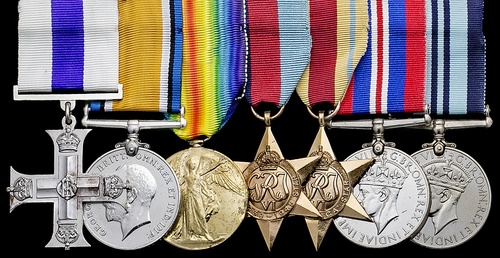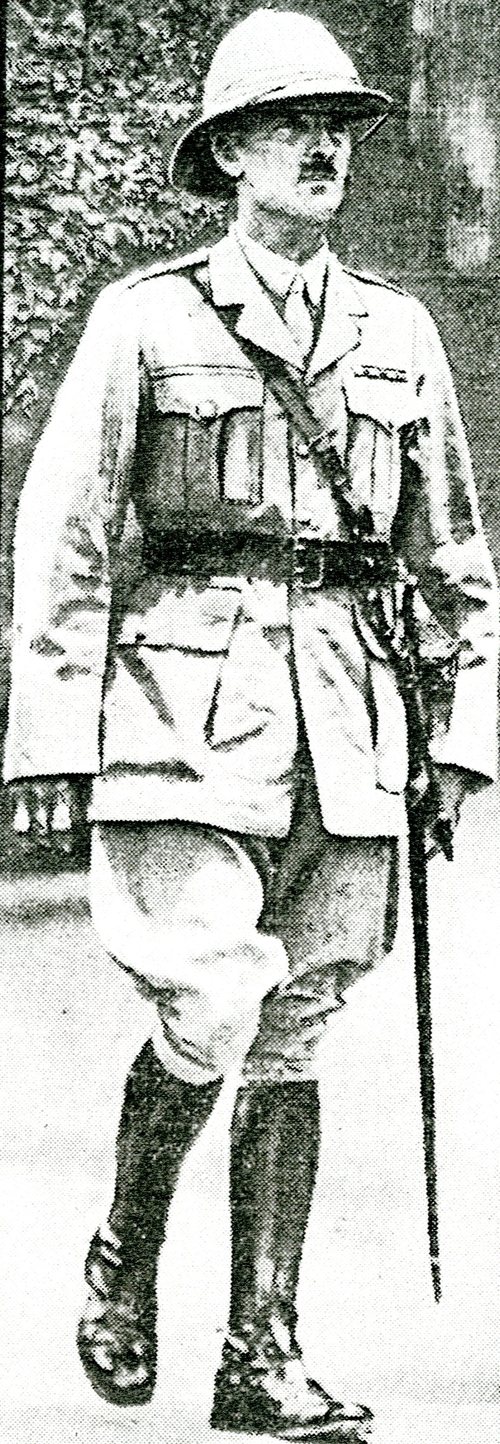Auction: 16003 - Orders, Decorations, Campaign Medals and Militaria
Lot: 14
An Impressive Great War 1917 M.C. Group of Seven to Lieutenant Colonel W.F. Charter, The Cameronians (Scottish Rifles), Commanding Officer of the British Legation Guard During The Civil Uprising in Addis Ababa, May 1936
a) Military Cross, G.V.R., the reverse engraved '2nd Lt. W.T. Charter 2nd Scottish Rifles, Ypres 1917'
b) British War and Victory Medals (2-Lt. W.F. Charter.; Lieut. W.F. Charter)
c) 1939-1945 Star
d) Africa Star
e) War Medal
f) India Service Medal, note ranks upon Pair, lacquered, light contact marks and pitting, very fine, originally housed in a glazed and gilt presentation case, by Spink & Son, London, this provided with the Lot if desirous to the purchaser(7)
M.C. London Gazette 25.8.1917 2nd Lt. William Forster Charter, Sco. Rif., Spec. Res.
'For conspicuous gallantry and devotion to duty. His company formed part of a working party two hundred yards from the enemy lines. They were discovered and subjected to very heavy shell fire. When ordered to withdraw, he remained behind and succeeded in getting in all the wounded of his company, working under very heavy fire. He also went out to order the covering party to withdraw, when all the working party had gone in. His great coolness and disregard of danger contributed very largely to the orderly nature of the withdrawal, whereby many casualties were avoided.'
The recommendation states: 'On the night of 2oth/21st June 1917, in the trenches near Hooge, this officer's company formed part of a Battalion working party, digging in no-man's land 200 yards from the German Line. The working party was discovered, and throughout the night was subjected to very heavy shell fire. When orders were given for the party to withdraw, 2nd Lieut. Charter remained behind, and was instrumental in getting in all the wounded of his company, working all the time under very heavy fire. He also, before going in, removed all effects and identifications
from the dead. He also personally went out to order the covering party, whose officers had been killed, to withdraw, when all the working party had got in. His great coolness and disregard of danger were a fine example, and undoubtedly contributed very largely to the orderly nature of the withdrawal, whereby heavy casualties were avoided.'
Lieutenant-Colonel William Forster Charter, M.C. (1893-1977), born Egremont, Cumberland; son of Commander W.F. Charter, R.N.; educated at Bedford School and H.M.S. Conway, being the Senior Cadet Captain; Charter was planting tea in Ceylon prior to the outbreak of hostilities in 1914, at the Sogama Estate, Pussellawa, also joining the Milward Contingent; with the outbreak of the Great War Charter returned to England with the first draft of ANZAC troops, commissioned Second Lieutenant, 13th Cameronians and was drafted to France where he was wounded due to gassing in July 1917, being awarded the Military Cross for conspicuous gallantry; transferred to the 40th Pathans, Indian Army with the rank of Lieutenant, 1918 being promoted Captain in 1919, seeing service as the Commandant of Small Arms School, Pachmari, reaching Field rank in 1933; Commanding Officer during the siege at the British Legation, Addis Ababa, May 1936; promoted Lieutenant-Colonel, 3.7.1936; commanded the 3rd Battalion Rajput Regiment during the Second War; staff duties, Cairo, from 1941; retired to Salcombe, Devon, living on and restoring a nineteenth century Schooner yacht; died, Otley, Yorkshire, 5.12.1977.
The British Legation Siege, Addis Ababa, May 1936
A period newspaper report provides an account of the events of May 1936 during the Italian-Abyssinian War:
'It will be recalled that the departure of the Emperor of Abyssinia from Addis Ababa on May 2nd of this year [1936] was the signal for grave rioting in the Ethiopian Capital. Hooligans and disbanded soldiers sacked the Palace, roamed the streets shooting and plundering while the city was in flames. It was during this trying time that Major Charter and his small band of Sikhs played a heroic part in the defence of the Legation and in the rescue of foreigners of all nationalities from the armed mobs then in control of the city. Major Charter's services, and of his men, were acknowledged by the Secretary of State for Foreign Affairs [Anthony Eden] in the House of Commons and in the words of His Majesty the King, Major Charter and the Officers and men under his command upheld the highest traditions of the Indian Army… Major Charter has been promoted Brevet Lieut.-Colonel for his services in Addis Ababa.'
An article which appeared in the Indian Army Association Newsletter 1991 offers further incite in the events:
'All foreign Legations in Addis Ababa, with the exception of the Americans, were situated in a diplomatic quarter some miles north of the city. The British Legation and connected buildings were in a large wooded and grassed compound of about one square mile and surrounded by a fence of sorts… At that time the situation between Ethiopia and Italy was fast deteriorating.'
As a consequence concerns were raised in Britain about the safeguarding of the British Legation. The British Government agreed with the Government of India that a company of Indian troops would be sent to protect the legation. The company, 'selected was the Sikh Company of the 5th Battalion (40th Pathans) 14th Punjab Regiment… The Company was commanded by Major W.F. Charter, MC and to assist him two officers were detached from other regiments. They were Captain G.A.E. Keene of 1st/16th Punjab Regt. and Lt. C.W. Pearson of the 1st/12th Frontier Force Regt. In addition Captain T.E. Palmer IMS with a Jemadar and 2 nursing orderlies.
On arrival the detachment constructed defence positions around the Legation; surveyed the other foreign legations as none of them had any military guards; checked and contacted people who would come under the wing of the Legation and generally familiarised themselves with the lie of the land.'
The Italians invaded in October 1935, and their advance began in earnest early the following year. Emperor Haile Selassie left Addis Ababa on the 2nd May. He ordered that the contents of his palace and the government stores were to be made available to his people, 'Thousands of looters, well-armed and full of drink, converged on these stores… Within one day the unrest spread to the whole city. Police and soldiers were well to the fore in the looting and many had old scores to settle. Parts of the city were set on fire and gutted. People then started to pour into the British Legation. From May 2nd to May 6th the Indian troops were on the go the whole time with little, if any, sleep or rest. Not only did they help construct a large refugee camp within the Legation grounds but they had to arrange latrines, cooking facilities and water supplies for up to 3,000 people. Meanwhile lorry patrols were sent out to keep close contact with other legations. Some foot patrols rescued stranded British protected subjects. Still other javans went out in lorries to supply arms and ammunition to various Indian and Arab traders who refused to abandon their shops and houses and wished to defend them...
The detachments had to be here, there and everywhere, and among Major Charter's papers are numerous notes calling for help saying that they were being attacked, or expecting to be attacked... All this time the troops ran the gauntlet of indiscriminate sniping and shooting. Finally there was an attack on the Belgian Legation by a large body of the Abyssinian Imperial Guard. A platoon commanded by Lt. C.W. Pearson was rushed to their aid. This resulted in a sharp and furious engagement and the Guard were completely routed by this much smaller unit. Lt. Pearson was awarded the MC for his personal bravery... The British Legation was also attacked four times and the Americans were attacked once.
By May 6th the officers and men were close to exhaustion. On that day over 25,000 Italian troops started to enter the town and they soon put down the rioting and restored a semblance of law and order... During the rest of their stay the detachment kept guard over the British Legation as well as a 'fatherly' eye on British nationals in the town... When the time came to depart the detachment marched to the Railway Station where an Honour Guard of Italian Askaris was drawn up and all the Diplomatic Corps were present. Everyone expressed their appreciation and admiration for the work of the Officers and Sikhs of the company. The Viceroy of Abyssinia - Marshal Graziani - made a most a complimentary farewell speech. After his inspection both sides mutually presented arms and the detachment entrained...
On the diplomatic level the Belgian Govt. was particularly generous in its thanks to the Indian troops. Major Charter received numerous letters of thanks and congratulations from far and wide, both diplomatic and famous. Major W.F. Charter was awarded a Brevet promotion to Lt. Col. for his outstanding leadership. Lt. C.W. Pearson won his MC and various awards were made to the Indian troops...'
Presentation medals (of which approximately 140 were struck) were awarded following the siege. The medal, as this Group to Lieutenant-Colonel W.F. Charter was sold in these rooms, Auction 15002, July 2016, Lot 488.
Subject to 20% VAT on Buyer’s Premium. For more information please view Terms and Conditions for Buyers.
Sold for
£1,500







